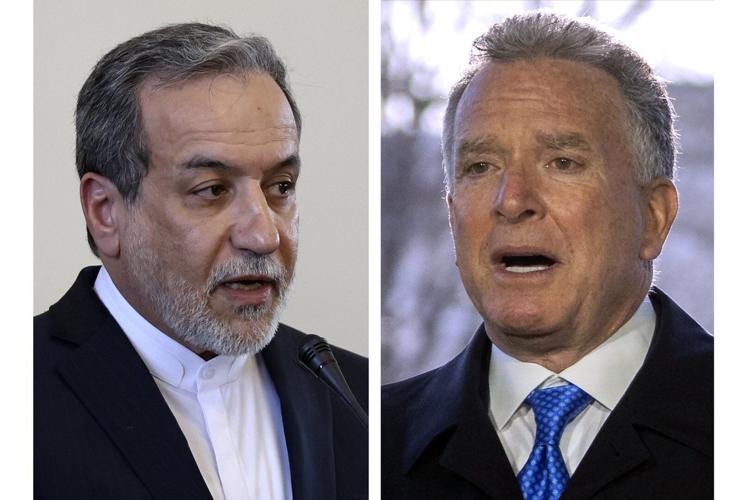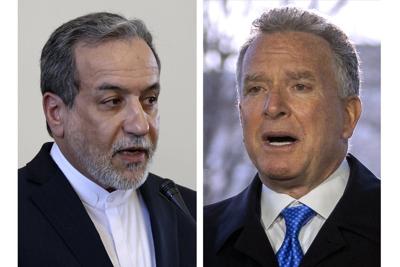ROME (AP) ŌĆö Iran and the United States prepared for a fifth round of negotiations over Tehran’s rapidly advancing nuclear program Friday in Rome, with enrichment emerging as the key issue.
U.S. officials up to insist Iran cannot continue to enrich uranium at all in any deal that could see sanctions lifted on Tehran’s struggling economy. Iran’s Foreign Minister Abbas Araghchi early Friday insisted online that no enrichment would mean ŌĆ£we do NOT have a deal.ŌĆØ
ŌĆ£Figuring out the path to a deal is not rocket science,ŌĆØ Araghchi wrote on the social platform X. ŌĆ£Time to decide.ŌĆØ
The U.S. will be again represented in the talks by and Michael Anton, the State DepartmentŌĆÖs policy planning director. While authorities havenŌĆÖt offered a location for the talks, another round in ItalyŌĆÖs capital took place at the Omani Embassy there. Oman’s Foreign Minister Badr al-Busaidi is mediating the negotiations as the sultanate on the Arabian Peninsula has been by both Tehran and Washington in the talks.
Enrichment remains key in negotiations
The talks seek to limit IranŌĆÖs nuclear program in exchange for the lifting of some of the crushing economic sanctions the U.S. has imposed on the Islamic Republic, .
Trump has repeatedly threatened to if a deal isnŌĆÖt reached. Iranian officials increasingly warn with their stockpile of uranium enriched to near weapons-grade levels.
ŌĆ£Iran almost certainly is not producing nuclear weapons, but Iran has undertaken activities in recent years that better position it to produce them, if it chooses to do so,ŌĆØ a new report from the U.S. Defense Intelligence Agency said. ŌĆ£These actions reduce the time required to produce sufficient weapons-grade uranium for a first nuclear device to probably less than one week.ŌĆØ
However, it likely still would take Iran months to make a working bomb, experts say.
Enrichment remains the key point of contention. Witkoff at one point suggested Iran could enrich uranium at 3.67%, then later began saying all Iranian enrichment must stop. That position on the American side has hardened over time.
Asked about the negotiations, State Department spokesperson Tammy Bruce said ŌĆ£we believe that we are going to succeedŌĆØ in the talks and on Washington’s push for no enrichment.
ŌĆ£The Iranians are at that table, so they also understand what our position is, and they continue to go,” Bruce said Thursday.
One idea floated so far that might allow Iran to stop enrichment in the Islamic Republic but maintain a supply of uranium could be a consortium in the Mideast backed by regional countries and the U.S. There also are multiple countries and the International Atomic Energy Agency offering low-enriched uranium that can be used for peaceful purposes by countries.
However, Iran’s Foreign Ministry has maintained enrichment must continue within the country’s borders and a similar fuel-swap proposal failed to gain traction in negotiations in 2010.
Meanwhile, Israel has threatened to strike IranŌĆÖs nuclear facilities on their own if it feels threatened, further complicating tensions in the Mideast already spiked by .
Araghchi warned Thursday that if Israel continues to threaten them, while also warning the U.S. it would view it as being complicit in any Israeli attack. Authorities allowed a group of Iranian students to form a human chain Thursday at , an area with incredibly tight security built into a mountain to defend against possible airstrikes.
Talks come as US pressure on Iran increases
Yet despite the tough talk from Iran, the Islamic Republic needs a deal. Its internal politics are inflamed over , or headscarf, with women still ignoring the law on the streets of Tehran. Rumors also persist over the government potentially increasing the cost of subsidized gasoline in the country, which has sparked nationwide protests in the past.
IranŌĆÖs rial currency plunged to in April. The currency has improved with the talks, however, something Tehran hopes will continue as a further collapse in the rial could spark further economic unrest.
Meanwhile, sits in tatters after Iran’s regional allies in the region have faced repeated attacks by Israel during its war against Hamas in the Gaza Strip. The collapse of Syrian President Bashar Assad’s government during a rebel advance in December also stripped Iran of a key ally.
The Trump administration also has continued to levy new sanctions on Iran, including this week, which saw the U.S. specifically target any sale of sodium perchlorate to the Islamic Republic. Iran reportedly received that chemical in shipments from China at its Shahid Rajaei port near Bandar Abbas. there killed dozens and wounded over 1,000 others in April during one round of the talks.
___
Gambrell reported from Dubai, United Arab Emirates. Associated Press writer Nasser Karimi in Tehran, Iran, contributed to this report.




























